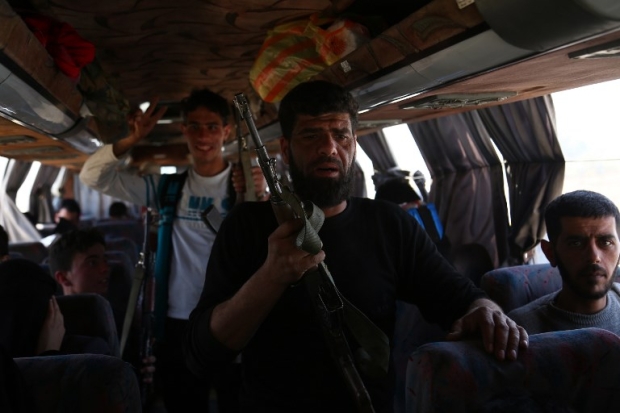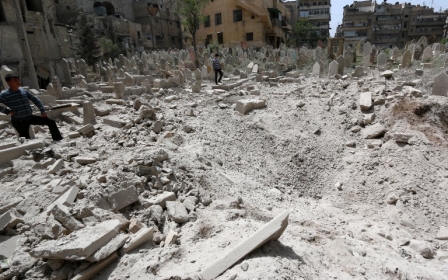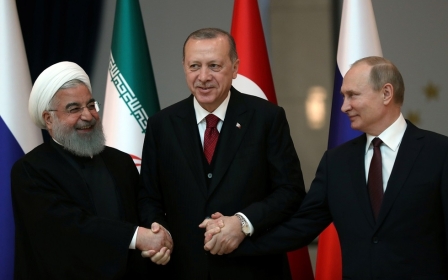Syrians in Douma 'suffocating' amid accusations of toxic gas use

At least 11 people were left struggling to breathe on Saturday after air strikes on Syria's rebel town of Douma, the Syrian Observatory for Human Rights monitoring group said, as rescuers alleged that toxic gases were used.
Syrian state media quickly denied that troops had deployed chemical weapons on Douma, the last opposition-held town in the battered Eastern Ghouta enclave.
Government forces had resumed a military blitz of Douma on Friday after an apparent breakdown in negotiations between government backer Moscow and Jaish al-Islam, the rebels who hold the town. The renewed bombing killed at least 30 people on Saturday, the monitor said, the day after negotiations collapsed. The monitor said it could not confirm whether the strikes were carried out by Syrian government warplanes or those of its ally, Russia.
On Saturday, the monitor said air strikes on the northern edges of the town had left 11 people, including five children, "suffocating and suffering shortness of breath".
The monitor told AFP it could not specify the reason for the symptoms, but the White Helmets rescue forces said Douma had been hit with toxic gas.
The Syrian American Medical Society (SAMS) said that medical staff they supported inside Douma had reported chlorine use.
"I spoke to one of the doctors inside the town, who told me... they received a number of wounded with symptoms from chlorine gas," said SAMS advocacy director Mohammad Katoub, who is based in Turkey.
For a week the bombardment had subsided as Moscow pursued peace talks with Jaish al-Islam, but talks came to an abrupt halt and air strikes suddenly resumed on Friday afternoon, killing dozens of civilians.
The observatory said at least 40 civilians died, including eight children, and even more were wounded.
"The bombing still hasn't stopped. There are three warplanes in the sky and two helicopters," Firas al-Doumi, a rescue worker inside Douma, told AFP news agency on Saturday morning.
The US State Department said on Saturday it was monitoring reports of a possible chemical weapon attack in Syria and said Russia should be held responsible if the incident did involve deadly chemicals,
"The regime's history of using chemical weapons against its own people is not in dispute," said the State Department. "Russia ultimately bears responsibility for the brutal targeting of countless Syrians with chemical weapons."
Syrian state television broadcast live footage of raids over Douma, showing billowing clouds of smoke over a devastated urban landscape and the state news agency SANA said rockets fired at Damascus from Douma on Saturday killed at least five civilians.
With Moscow's help, Syrian President Bashar al-Assad has ousted his armed opponents from nearly all of Eastern Ghouta, their former stronghold on the edge of the capital.
Since 18 February, the government's offensive has killed more than 1,600 civilians and kept residents cowering in basements for weeks. A ground assault then sliced the area into three isolated pockets, each held by different rebel factions.
The government has used a combination of fierce bombardment and two negotiated withdrawals to empty out 95 percent of the enclave but rebels are still entrenched in the largest town of Douma.
Assad is keen to recapture Ghouta to eliminate the opposition from the outskirts of Damascus and end years of rocket fire on the capital.
Withdrawal talks collapse
Under Russian-brokered deals, two rebel-held pockets of Eastern Ghouta were evacuated last month that saw more than 46,000 rebels and civilians bussed to opposition-held Idlib province in the northwest.
Tens of thousands also fled into government-controlled territory through safe passages opened by Russia and Syrian troops.
Moscow stepped in to negotiate a deal for Douma, the third and final pocket where Jaish al-Islam had been angling for a reconciliation agreement that would allow them to stay as a police force.
All of a sudden, with no warning, the shelling starts. There were 20 strikes in 15 minutes
- Mohammed, medic, Douma
Following a preliminary accord announced by Russia on Sunday, nearly 3,000 fighters and civilians were evacuated from Douma to northern Syria.
But as talks dragged on, Syria and its Russian ally threatened Jaish al-Islam with a renewed military assault if they did not agree to withdraw.
It remains unclear exactly why the talks fell apart this week.
SANA said they faltered when Jaish al-Islam refused to release detainees they were holding in Douma, adding that the military assault would only stop if hostages are released.
Others have blamed internal rebel divisions over the withdrawal process. Top Jaish al-Islam political figure Mohammad Alloush on Friday blamed power struggles between the government's allies.
The resumption of strikes stunned civilians. "All of a sudden, with no warning, the shelling starts. There were 20 strikes in 15 minutes," Mohammed, a medic, told AFP from Douma on Friday.
The wounded were being brought in with fractures and other injuries, and there had been three amputations on Friday alone, he said.
Syrian troops also carried out a ground operation Friday in the orchards surrounding Douma.
On Saturday, fresh artillery fire hit those fields, said the Observatory.
"The regime is trying to tighten the noose around Douma from the west, east, and south," said Observatory head Rami Abdel Rahman.
New MEE newsletter: Jerusalem Dispatch
Sign up to get the latest insights and analysis on Israel-Palestine, alongside Turkey Unpacked and other MEE newsletters
Middle East Eye delivers independent and unrivalled coverage and analysis of the Middle East, North Africa and beyond. To learn more about republishing this content and the associated fees, please fill out this form. More about MEE can be found here.





